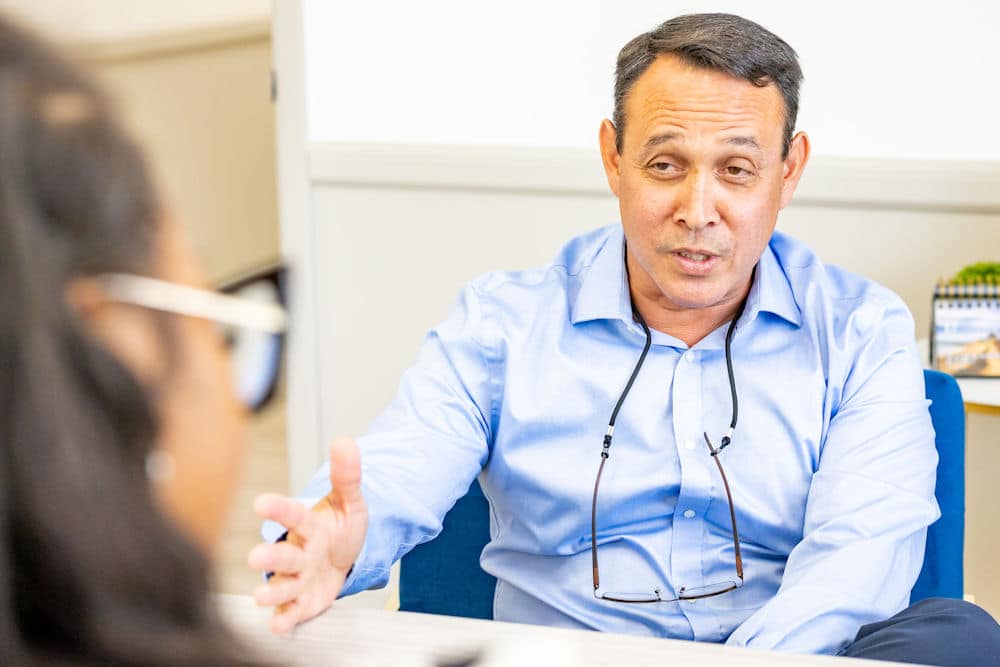Medication-Assisted Treatment (MAT) in Fort Lauderdale
Medication-assisted treatment is the use of FDA-approved medications in combination with counseling and behavioral therapies to provide a “whole-patient” approach to the treatment of substance use disorders. Combining medication and therapy can successfully treat addiction, so medication-assisted treatment can help sustain recovery. Learn more about our addiction treatment programs in Fort Lauderdale and how we can help you overcome drug and alcohol addiction today!

What is Medication-Assisted Treatment (MAT)?
Medication-assisted treatment (MAT) is the use of medical treatment and therapy to help patients recover from alcohol or drug abuse. MAT is sometimes also called medical detox, although this term more accurately describes the initial period after someone has stopped using drugs or alcohol when they are at risk of potentially life-threatening withdrawal symptoms.
While MAT has been part of standard care for some time, there has been a recent shift in focus on its importance. Medication-assisted treatment incorporates a range of FDA-approved medications designed to help people stop using drugs and stay clean.
For example, Suboxone is a combination of buprenorphine and naloxone that works by binding to opioid receptors in place of heroin or prescription painkillers. Methadone acts similarly but with longer-lasting effects. These two MAT drugs allow users who were once dependent on dangerous drugs to lead productive lives with full physical health and clear minds.
What to Expect in Our Medication-Assisted Treatment
Agape Treatment Center’s MAT uses FDA-approved medications to help individuals through the early stages of addiction recovery. These MAT medications assist in alleviating withdrawal symptoms while reducing cravings and maintaining abstinence from substance use. The following medications are typically involved in a medication-assisted treatment plan:
- Buprenorphine
- Methadone
- Naltrexone
- Naltrexone
Each of these medications serves a unique purpose in helping patients achieve long-term recovery. The medications offered are used in a variety of different settings. Some are administered through a doctor’s office, while others can be taken at home with a minimum amount of oversight from healthcare providers.
Some patients need to undergo periodic drug testing as part of their treatment plan. Others may only need medication as part of an intensive outpatient program (IOP) or residential program that incorporates other therapies such as group and individual counseling, as well as support from family members and friends.
MAT is highly effective in helping people recover from addictions to heroin and other opioid substances. The medications can alleviate cravings, so patients find it easier to resist substance use. With continued use of these treatments, patients also reduce their chances of relapse, which helps them achieve long-term sobriety.
Methadone
Methadone is one of the most commonly used MAT medications for replacing opioids. This medication helps to ease withdrawal symptoms and cravings by providing a controlled dose of opioids. The dosage is tailored to each individual’s needs, usually the smallest amount required to stabilize their condition. Methadone comes in liquid, pill, and wafer forms. It’s typically taken once a day. The effects of each dose can last for four to eight hours.
When used correctly, methadone can be a valuable tool in medication-assisted treatment (MAT). But, it’s very important to remember that methadone is still an opioid and can be abused. This is why it should only be used under professional supervision in a treatment setting. When a patient is ready to end methadone treatment, it should be done gradually to avoid withdrawal symptoms.
Buprenorphine
Buprenorphine, like methadone, is used in medication-assisted treatment to assist in suppressing and decreasing cravings for opioids. But, the way this medication works is a little different from methadone. This medicine acts as an opioid partial agonist. This means that it produces effects that are similar to the effects of other opioids but these effects are much less intense.
These effects plateau after a moderate dose is taken, regardless of any increase in dosage. This “ceiling effect,” in combination with the prolonged effects of the medication, enhances its safety in MAT and reduces the risk of substance dependence and abuse. Typically, treatment with buprenorphine commences after a client has refrained from using other opioids for a period ranging from 12 to 24 hours.
Naltrexone
Most opioid addiction treatment medicines work by activating opioid receptors to suppress cravings. But, naltrexone takes a different approach in MAT by binding to opioid receptors. This medication blocks them off and prevents cravings. Even if someone relapses and uses an opioid, naltrexone stops them from getting high.
Before starting naltrexone, a person must go through complete withdrawal from all opioids or other addiction medications for about seven to ten days. Naltrexone comes in pill form, known as ReVia and Deparde. Individuals may also use an extended-release injectable naltrexone option called Vivitrol.

Achieve Sobriety at Agape Treatment
Our team understands that MAT programs are often needed for some people to achieve long-term recovery and sobriety. MAT programs are primarily used to treat opioid use disorder. This treatment approach can also help those who have addictions to prescription pain relievers that contain opiates. The prescribed medication has several key things it does. Some of the important factors include the following.
- Operates to normalize brain chemistry
- Block the euphoric effects of alcohol and opioids
- Relieve physiological cravings
- Normalize body functions without the negative effects of the abused substance
Medications used in MAT are approved by the Food and Drug Administration (FDA), and MAT programs are clinically driven and tailored to meet each patient’s needs.
Addressing Concerns About Medication-Assisted Treatment Services
If you’re ready to get your life back and enjoy sobriety for good, medication-assisted treatment can help. Our drug and alcohol addiction treatment center in Fort Lauderdale can help you! Instead of just treating physical symptoms with medication, medication-assisted treatment helps restore chemical balance. This is a process known as neurochemical rewiring.
This method uses FDA-approved medicines like methadone and buprenorphine (Suboxone) to minimize cravings and help you develop healthier patterns of behavior. Essentially, these medications make it easier for you to overcome withdrawal symptoms. They greatly reduce substance use without giving way to intense cravings or dangerous side effects.
It’s common for people to think that medication-assisted treatment (MAT) is simply substituting one drug for another, but this isn’t the case. Instead, these drugs help rewire your brain and support you in developing healthy habits that can help you reduce or quit substance use altogether. They work by targeting specific receptors in your brain to block cravings.
So instead of only treating physical symptoms, these drugs also improve your ability to resist temptation, stay sober, and focus on your recovery without experiencing dangerous side effects. When used correctly under medical supervision, MAT can be effective at helping people overcome substance abuse. For many recovering addicts it offers a better chance of long-term recovery than any other treatment method.
Let Agape Treatment Center Help You Today

Agape Treatment Center is here to help you truly and completely break free from the bondage of substance abuse. We take mental health issues of all varieties very seriously and provide a safe, nurturing environment where one can learn about the disorders plaguing them from an emotionally unstable life.
Our licensed mental health clinicians can fully assess our clients and meet them exactly where they are in the recovery journey. So, if you have been searching for South Florida medication-assisted treatment services for substance abuse, look no further than Agape Treatment. Whether you’re struggling with opioid addiction, opiate addiction, alcohol use disorder, or any other type of addiction problem, our admissions team can help guide you to the best programs to treat your individual needs.
If you’re ready to end your battle with addiction and get your life back on track, contact us today. We are determined and dedicated to getting you the help you need. Our clients can become and remain sober with the help of our therapy and medical interventions. Recovery is only a phone call away, so reach out to us now to receive support and begin your journey to recovery!
- February 22, 2023
- Updated Date: October 2, 2024
Discover Programs

Stephanie Robilio is an accomplished Clinical Director at Agape Behavioral Healthcare. With a Master of Social Work degree, LCSW license, and extensive training in Rapid Resolution Therapy under her belt, she brings a wealth of expertise to her role. Her unique combination of education and experience allows her to provide exceptional care to clients and lead her team with confidence. Stephanie’s joy comes from witnessing the moments when her patients creatively connect the dots and bravely move toward reclaiming their power. Her purpose is to help individuals understand their past so they can create a future full of hope, growth, and success. Stephanie attributes a large portion of her success to the supportive culture and strong sense of community fostered by the Agape team.



